Portfolio
At the end of March 2024, MTU had 35 holdings, down from 40 in April 2023 (the last time we published a note), and the median market cap of the companies in which it was invested was £707m. Reflecting the investment style, on average, MTU’s stocks tend to be higher-rated but faster-growing than typical UK smaller companies, with balance sheets that are also strong.
Looking at consensus estimates for the next financial year, the P/E ratio on the portfolio was 18.4x at end March 2024 EV/EBITDA 13.3x, and average EPS growth was estimated at 4.4%. Net debt/equity was forecast at -3.5% (i.e. more cash than debt). Since our last note, MTU’s P/E and EV/EBITDA ratios have fallen, in line with the general trend of the wider UK small cap market, as we demonstrated in Figure 2 on page 6. However, MTU’s EPS growth and net debt to equity have improved since our last note, which could be viewed as reinforcing the notion that the market is mispricing the fundamental strength of UK companies.
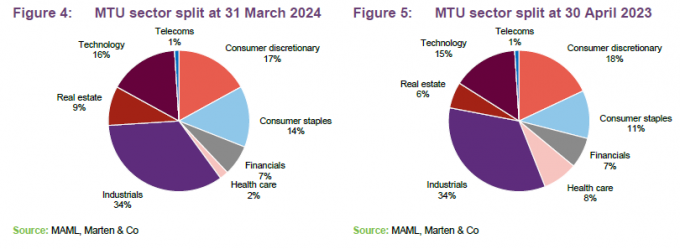
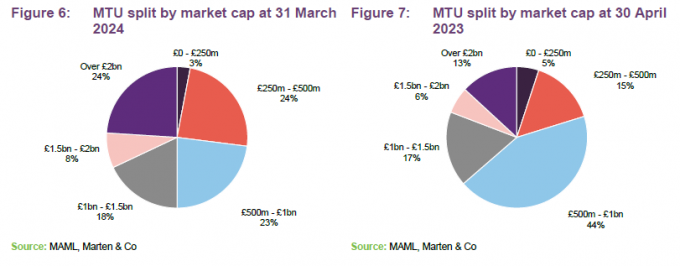
The sector split is driven by MAML’s stock selection decisions. At the end of March 2024, there was no allocation towards energy, basic materials, or utilities. Industrials, consumer, and technology stocks remain MTU’s largest sectoral allocations. The most notable shift has been the 6% reduction in healthcare, which reflects the takeovers of Ergomed and Dechra Pharmaceuticals.
On a market-cap level, the largest change has been the reduction in exposure to £500m to £1bn cap companies, reflecting both recent trading activity but also Charles’s intention to slightly reduce MTU’s AIM stock exposure to 21%, a level he feels more comfortable with. MTU’s allocation to sub £1bn market cap companies has fallen from 64% to 50%.
Top 10 holdings
MTU has settled on a 35-stock portfolio
The list of MTU’s 10-largest holdings has been more stable since our last note, with the top seven holdings reappearing. The turnover in MTU has begun to normalise since our last publication, which covered a period in which MTU was transition to a more concentrated portfolio. All of the new entrants in the top 10 have been the result of strong performance rather than trading activity.
Since we last published, Charles has sold out of four companies (Keystone, Strix Group, FDM, and Integrafin) and added one other (Bytes Technology). MTU’s current 35-holding portfolio is likely to be the number that investors can expect it to hold going forward, as the fund will likely operate on a one-in-one-out basis.
Charles added to MTU’s holdings of discoverIE Group, Marshalls, and LondonMetric Property Group, and Bytes Technology.
Two positions were lost to takeovers during the last 12 months, Ergomed and Dechra Pharmaceuticals. Both of which were amongst MTU’s top contributors to performance, and as such are covered in the performance section on page 19. Spirent Communications, a telecommunications firm, will follow them out of the portfolio shortly, as after a bidding war between US rivals Keysight Technologies and Viavi Solutions, Keysight triumphed with a £1.16bn offer.
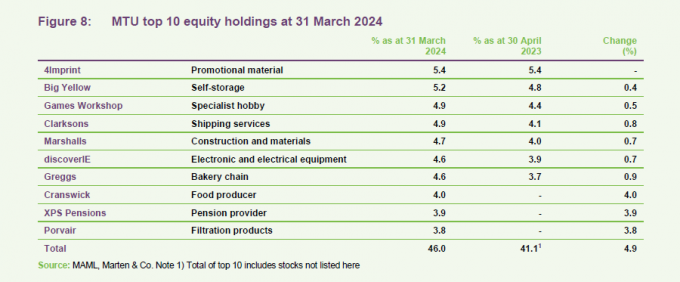
Looking at the three new entrants to the top 10 since we last published:
Cranswick
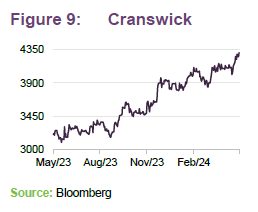
Cranswick (www.cranswick.plc.uk) is a producer and supplier of meat products, typically serving a British clientele. Cranswick has a diverse product offering, a result of it focusing on chicken and pork meat, versatile foodstuffs. The company also benefits from vertical integration, increasing its investment into its pig farms and food milling operations. Cranswick now has self-sufficiency for over half of its pork production. Its capacity has been further expended by its recent acquisition of Froch Foods, a poultry and pork processor.
For the six months ending September 2023, its most recent interim results, Cranswick reported double-digit growth across multiple key metrics, including revenue and operating profits. Its management comment that the catalyst for this growth being both the increased volumes of sales and the ability to pass on inflation to its end retailers. Its strongest core product was its gourmet line, which comes despite the ‘cost of living’ crisis in the UK. Cranswick not only utilised its strong revenues to fund further investment (expecting c.£100m in capex over their 2024 FY), but also to bolster shareholder returns, having grown its dividend by 10% over the period. Cranswick’s management has also highlighted the strong performance of the company over Christmas, in an unscheduled trading update. Its performance was bolstered by strong-than-expected sales over the Christmas period, indicating that they are expecting stronger pre-tax profits for 2024 FY than initially anticipated.
XPS Pensions Group
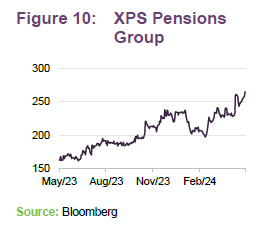
XPS Pensions Group (www.xpsgroup.com) is an employee benefit consultancy firm, largely focusing on providing pension advice in the UK. XPS Pensions has delivered consistent, compounding growth based on its past reporting, leading it to report record earnings and profits for its 2023 FY. Whilst pension actuarial and consulting remain the largest nominal components of its revenues, its investment arm has seen the largest percentage growth in revenue over the last five years.
While the quality of XPS’s services looks to have been a major driver of its growth (having reported consistent year-on-year revenue growth over the last five years) it has also benefitted from external factors. Charles highlighted that the mini budget from Liz Truss in September 2002 caused a dramatic sell-off in gilts, sparking a liability-driven investment crisis as pension funds were forced to liquidate assets. Demand for XPS’s services increased as a result. XPS’s management has improved its outlook, now expecting 20% YoY growth over its 2024 FY. The company is also hopeful that this growth can be repeated again over 2025, highlighting a number of new client wins that it says will help propel revenues.
Porvair
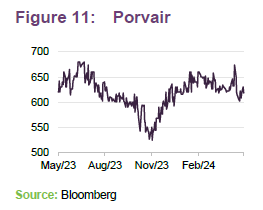
Porvair (www.porvairfiltration.com) is a specialist filtration an environmental technology firm based in the UK, but with operations in the US, Germany, and China. Its products are niche and service complex industries such as aviation, molten metal filtration, and laboratories. Charles comments that due to the very nature of filters, Porvair’s products have a limited life and require regular replacement, allowing the company to generate strong recurring revenues; compounded by the fact that the complexity of its end markets makes switching suppliers difficult.
2023 was a record year for Porvair, reporting record revenues and profits. The report highlights that figures were driven the same structural tailwinds that have supported past earnings, such tightening environmental regulation, and the desire for greater emission efficiency, where, for example, Porvair’s recent earnings benefitted from the rebound in air travel. Its management also remains positive for 2024, commenting that it has promising acquisitions on the horizon and a strong orderbook already locked in. It does note that given the company’s overseas operations, stronger sterling could weigh on the company’s earnings.
New purchases
Bytes Technology Group
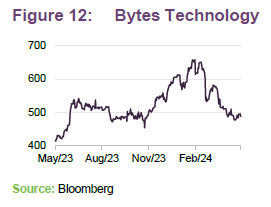
Bytes Technology Group (www.bytes.co.uk) is a top 10 UK re-seller of software such as Oracle, Citrix, Mimecast, Check Point. Half of its business can be attributed to Microsoft and half of that in Microsoft 365, its suite of productivity software (e.g. word, excel). In 2022, Bytes was named Microsoft Partner of the year for Operational Excellence out of 3,900 partner entries globally.
Some two thirds of their c. 5,000 clients are in the private sector (e.g. Linklaters, M&S, the BBC, Thames Water, Bupa, Asos, William Hill) and one third to the public sector (e.g. the NHS, Liverpool City Council, Ofgem, University of Aberdeen). The largest single client is 1.5% of gross profits, thus Charles believes that there is no customer concentration risk. Bytes’s revenues are effectively recurring – as all their clients need to renew their licenses – so its business model is non-cyclical and predictable.
Charles has provided us with a detailed description as to why he believes Bytes Technology is a classic “Montanaro” stock. In his mind the business is simple to understand and ticks his quality and growth boxes:
- Quality: it is focused; simple to understand; non-cyclical; no client concentration or inventory risk; negative working capital ensures a strong balance sheet (net cash); must have products so “non-discretionary” and predictable revenues;
- Growth: Bytes’s addressable market is forecast to grow by 8% – 10% over the next five years driven by price increases by Microsoft (5% – 10% p.a.) which itself is forecast to grow double digits organically; the migration to the cloud; the structural shift to the hybrid office and working from home; and increasing demand for cyber security software.
The icing on the cake for Charles is that he believes that Bytes Technology offers a play on AI on two fronts: firstly, their internal staff are reviewing greater internal efficiencies and productivity gains; secondly, clients will be upgrading to 365 Co-Pilot (Microsoft’s AI product)- making Microsoft a stickier, more attractive product. Charles believes that by bundling Co-Pilot into every product – Excel, e-mail, Powerpoint etc. – Microsoft will be able to grow faster and increase prices which will benefit Bytes.
Bytes Technology also satisfies Charles’s criteria for superior management and culture. He comments that previous entrepreneurial CEO Neil Murphy had more than 30 years’ experience in the IT sector. He had a Glassdoor rating of 4.4* meaning 95% approval rating and he was one of the most responsive to our questions. Unfortunately, Neil has recently left the company, though due to reasons not associated with Bytes. Of the top 50 fee earners, only one has left in the last six years.
On 24 May 2023, Montanaro’s investment committee approved Bytes Technology to go on its approved list (of highest quality stocks). The first investment was made in June 2023 at a price of 506p. Although a core long-term holding, partial profits have already been taken. At the time of writing, the share price is 542p.
LondonMetric Property
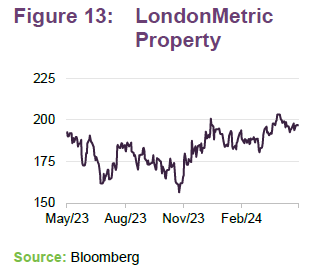
LondonMetric Property (www.londmetric.com) is a FTSE 250-listed REIT, whose portfolio operates across a diverse range of sectors, though its largest sectoral allocation is in logistics properties and makes up 41% of its portfolio. Its management intends for it to capitalise on ‘emerging consumer behaviour’, such as the evolving trends in demand for online shopping, convenience, healthcare and staycations. LondonMetric’s assets have recently increased on the back of two successful mergers, taking over CT Property Trust and LXi REIT. Charles purchased LondonMetric in January, prior to LXi REIT agreeing to the takeover.
LondonMetric’s recent semi-annual results for the six months ending 30 September 2023, indicated a positive period of growth for the company, with earnings up 5.8%, thanks to a 6.7% increase in rental income. The biggest driver of this was its urban logistics assets, which reported rental uplifts of 43%. LondonMetric also made headway in improving its balance sheet over the period, selling down £157m in assets (at a negligible discount-to-book value) and using the proceeds to reduce its loan-to-value (i.e. its debt ratio) to 29.5%.
Marshalls
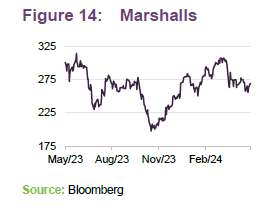
Marshalls (www.marshalls.co.uk) is a manufacturer of natural stone and concrete landscaping products and has recently its annual results for its 2023 financial year, ending 31 December 2023. Marshalls faced a tough 2023 given its revenues fell 13% YoY and profits fell by 30%. Its management attributed its performance to weak macro-economic conditions impacting the activity in its end markets, such as lower house-building activity over the years, feeding through to demand for its goods.
Marshalls’ management made proactive changes to the company to offset these losses, reducing capacity and lowering overheads. They also continued to invest in its operations, bringing a plant in St Ives to operation, as well as investing in a new product development. However, its management expects a gloomier outlook for 2024, anticipating lower revenues than initially forecasted and profits in line with its 2023 level. Given the weakening outlook, its board saw fit to cut its 2023 dividend by half, compared to its 2022 level. Charles has confidence in the recovery of Marshalls’ end markets (as does its board, highlighting structural trends supporting the demand for its products), and took recent share price weakness as an opportunity to increase MTU’s holding.
discoverIE Group
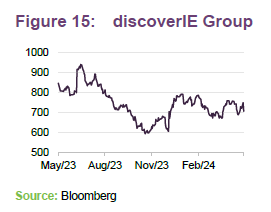
discoverIE Group (www.discoverie.com) is a UK-based designer and manufacturer of customised and niche electronic components for industrial use across the world. It released a trading update in April 2024, in advance of its annual results for its year ending 31 March 2024. The company outlined that it has made ‘good financial and strategic progress’ and is on track to deliver results in line with its own expectations. While its sales were up only 1% YoY, it follows two years of strong sales growth (up 48% in total), perhaps signalling that the company successfully navigated a more difficult 2023. Its management has stated that its second half will be stronger than its first, returning to positive organic growth as well as expending its margins relative to the first half. It also reported that the acquisitions made in 2023 are performing as expected.
Sales
Charles sold out of Keystone Law, a UK law firm, as he believed that the company had realised its growth potential, with its future outlook no longer looking sufficiently attractive.
He sold Strix Group, a manufacturer of kettles and water control systems, due to his concerns around the quality of its management. In 2023 its CFO unexpectedly left the company, and the company reported a decline in EPS of 16% in its 2023 full year results, despite also reporting a 35% increase in revenues and 28% increase in profits.
Charles sold out of FDM Group, a technology consultancy, as he believed that his other holdings offered better upside.
His final outright sale was of Integrafin, an asset manager. He decided to exit his position as he felt the portfolio had too high an exposure to asset managers, which can be viewed as a highly market-sensitive asset class, and favoured other holdings such as Liontrust.

